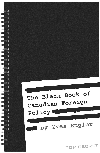
The Black Book Of Canadian Foreign Policy
Yves Engler
Fernwood Publishing
$24.95
paper
284pp
978-1-55266-314-1
In The Black Book of Canadian Foreign Policy, Montreal writer and activist Yves Engler compiles a long and disgustingly dirty laundry list of Canada’s international transgressions. For those who would stand by Canada’s status as a “peacekeeper” and “honest broker,” Engler presents an impressive cascade of evidence that Canada is not exactly a force for good in the world.
According to Engler, Canada has carefully maintained its “good guy” image as a convenient guise for its real foreign policy priorities: the aiding and abetting of empire (first British, now American), and protection and promotion of investments of our major corporations. Our country is home to some of the world’s largest mining, resource, and manufacturing firms; it comes as no surprise that these, along with our five banks, have made multimillion dollar investments in places like the Congo, Guatemala, Iraq, Chile, apartheid South Africa, China, Vietnam, and others. Our diplomatic efforts and foreign aid policies have not only directly supported these corporations, Engler demonstrates, but have also been used to rewrite labour and environmental codes for their benefit, leading to some of the worst industrial practices in the world.
Engler further argues that our international aid as well as weapons sales have helped prop up a rogue’s gallery of brutal dictators: our forces have been involved in the deposition of democratically elected leaders such as Aristide in Haiti and Lumumba in the Congo. For all the positive spin on our refusal to join the US in invading Vietnam or Iraq, closer examination shows that we have provided extensive military and logistical support for both ventures. Even our peacekeeping and Pearson’s role in the Middle East – which lead to his Nobel Peace Prize – are revealed by Engler to have had questionable aims and results. With recent talk of “pulling our weight” in the world, it becomes clear that we are a willing, if underhanded, junior partner of the United States. As Engler informs us, Jean Chrétien in his memoir recounts telling Bill Clinton, “Keeping some distance will be good for both of us. If we look as though we’re the fifty-first state of the United States, there’s nothing we can do for you internationally, just as the governor of a state can’t do anything for you internationally. But if we look independent enough, we can do things for you that even the CIA cannot do.”
While Engler’s writing delivers plenty of punch, he mostly lets facts – meticulously researched and substantiated – speak for themselves. The Black Book is so full of detail it can make one’s head swim: at times, it is a rather academic read. It will doubtless prove a significant resource for international solidarity activists and specialists in foreign policy. For the rest of us, it provides a valuable glimpse into shadowy machinations that all too often fall entirely under our radar.
Engler’s is a high ideal: that Canadians, armed with the knowledge in his book, “debate and shape what is being done around the world in their name,” and ultimately “demand altruistic aid, real international cooperation, benevolent peacekeeping instead of militarism, and the rule of law instead of an empire’s might.” Foreign policy, however, has almost never been high on our election agenda: our leaders, at first daunted by the world stage, soon find it an easy place to perform. Perhaps with further activism Engler and others will succeed in altering the tinctures of our national discussion. mRb






0 Comments